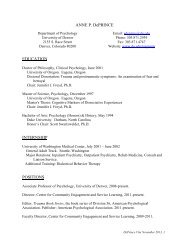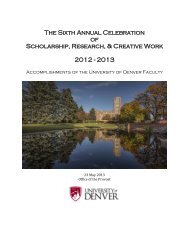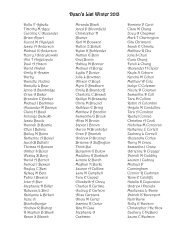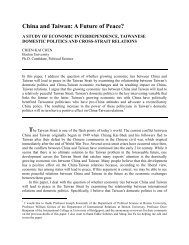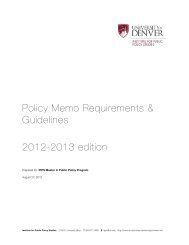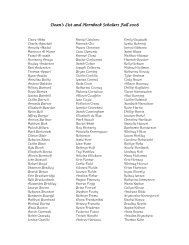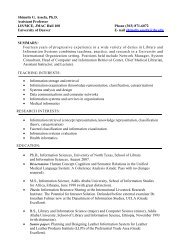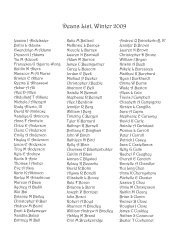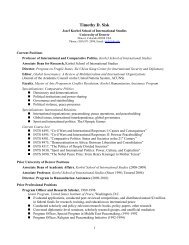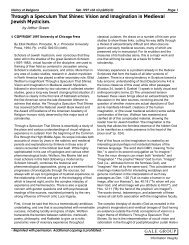The Law of the Living: On Clarice Lispector
The Law of the Living: On Clarice Lispector
The Law of the Living: On Clarice Lispector
Create successful ePaper yourself
Turn your PDF publications into a flip-book with our unique Google optimized e-Paper software.
YANARA FRIEDLAND<br />
<strong>The</strong> <strong>Law</strong> <strong>of</strong> <strong>the</strong> <strong>Living</strong>:<br />
<strong>On</strong> <strong>Clarice</strong> <strong>Lispector</strong><br />
A Breath <strong>of</strong> Life, by <strong>Clarice</strong> <strong>Lispector</strong>. New York, New York: New Directions,<br />
2012.<br />
Agua Viva, by <strong>Clarice</strong> <strong>Lispector</strong>. New York, New York: New Directions,<br />
2012.<br />
Near to <strong>the</strong> Wild Heart, by <strong>Clarice</strong> <strong>Lispector</strong>. New York, New York:<br />
New Directions, 2012.<br />
<strong>The</strong> Hour <strong>of</strong> <strong>the</strong> Star, by <strong>Clarice</strong> <strong>Lispector</strong>. New York, New York: New<br />
Directions, 2011.<br />
<strong>The</strong> Passion According to G.H., by <strong>Clarice</strong> <strong>Lispector</strong>. New York, New<br />
York: New Directions, 2012.<br />
It is easy to become enamored by <strong>Clarice</strong> <strong>Lispector</strong>, be it for her<br />
sphinx-like beauty, her youthful genius (Near to <strong>The</strong> Wild Heart was<br />
published and received <strong>the</strong> prestigious Graça Aranha Prize when she<br />
was only 23), or her feisty journalisms, later anthologized in Cronicas.<br />
It is also, no doubt, intriguing to get caught up in her short but complex<br />
life: her family’s violent exile from <strong>the</strong> Ukraine and experience<br />
<strong>of</strong> pogroms in <strong>the</strong> 1920s, her marriage to a Brazilian diplomat and<br />
subsequent travel to postwar Europe, her rise first to literary celebrity<br />
and <strong>the</strong>n cult-beckoned mythos while living utterly isolated in a<br />
small apartment close to <strong>the</strong> Copacabana. Her near-death experience<br />
through a fire and <strong>the</strong> permanent injury <strong>of</strong> her writing hand, or <strong>the</strong><br />
prophetic lines in her last, posthumously published book A Breath <strong>of</strong><br />
Life, which seem to foretell her own death caused by an incurable<br />
disease. Clearly, it is easy to link her life and work, and, predictably,<br />
I have, but what makes <strong>Clarice</strong> <strong>Lispector</strong> a true gem (and thus New<br />
Directions’ re-release a noble and brave move), is her fearless plunge<br />
into <strong>the</strong> epic and mystical questions <strong>of</strong> our existence. In <strong>The</strong> Passion<br />
According to G.H. she writes: “I had found <strong>the</strong> enigma itself. Since <strong>the</strong><br />
thing can never really be touched. <strong>The</strong> vital node is a finger pointing<br />
at it and <strong>the</strong> thing being pointed at, wakens like a milligram <strong>of</strong> radium<br />
in <strong>the</strong> tranquil dark.”<br />
93
Hélène Cixous, an early proponent <strong>of</strong> <strong>Lispector</strong>’s version <strong>of</strong> litera<br />
ture, suggests that most <strong>of</strong> her work can be understood to deal centrally<br />
with what she calls “<strong>the</strong> law <strong>of</strong> <strong>the</strong> living,” which suggests<br />
that <strong>the</strong> boundaries between <strong>the</strong> author’s consciousness and created<br />
text are fragile and transparent. In order to enter “<strong>the</strong> law <strong>of</strong> <strong>the</strong> living,”<br />
<strong>the</strong> one who authors has to be in a state <strong>of</strong> open receptivity and<br />
guided by <strong>the</strong> text itself without any preconceived notions <strong>of</strong> how <strong>the</strong><br />
story will take shape.<br />
<strong>The</strong> Hour <strong>of</strong> <strong>The</strong> Star, a book that opens with a list <strong>of</strong> thirteen titles<br />
between which <strong>Lispector</strong> places her own signature, immediately suspends<br />
<strong>the</strong> illusion <strong>of</strong> most novels that <strong>the</strong> author is <strong>of</strong>f stage. Instead a<br />
very reluctant crossbreed <strong>of</strong> author/narrator/character descends into<br />
<strong>the</strong> text, and as “he” lays out his intentions, is written into existence.<br />
<strong>The</strong> interpolated male “author” not only continues to interrupt <strong>the</strong><br />
narrative but also points towards his own fictionality: “Forgive me but<br />
I’m going to talk to myself, and as I write I’m a bit surprised because<br />
I discover I have a destiny . . . Existing isn’t logical. <strong>The</strong> action <strong>of</strong> this<br />
story will end up with my transfiguration into somebody else and my<br />
materialization finally as an object.”<br />
<strong>The</strong> interruptions at once break <strong>the</strong> spell <strong>of</strong> fiction but also ask<br />
who is truly authoring this book. <strong>The</strong> reader faces <strong>the</strong> various degrees<br />
<strong>of</strong> limitation that all members <strong>of</strong> <strong>the</strong> narrative essentially bump up<br />
against. <strong>On</strong> <strong>the</strong> lowest rung is <strong>the</strong> main character Macabea, who is<br />
pushed around not only by <strong>the</strong> world she was born into but also by<br />
S. M. Rodriguez her supposed author. Although he can halt <strong>the</strong> narrative<br />
with his “ruffle-<strong>of</strong>-<strong>the</strong> drum,” he is helpless when it comes to<br />
changing <strong>the</strong> outcome <strong>of</strong> <strong>the</strong> story and eventually has to admit his<br />
authorial restrictions. “I am going to do everything I can to keep her<br />
from dying . . . I fear nakedness for it is <strong>the</strong> last word.” Both reader<br />
and “author” follow <strong>the</strong>se helpless prolongations until her death suddenly<br />
descends without any fur<strong>the</strong>r warning. <strong>Lispector</strong> “decreates”<br />
(in Simone Weil’s sense) <strong>the</strong> gesture <strong>of</strong> authoring, interrupting both<br />
her own and her creations’ impulse to dominate <strong>the</strong> text.<br />
Few o<strong>the</strong>r writers in <strong>the</strong> twentieth century have so fearlessly and<br />
un apologetically abandoned reader expectations, plot conventions and<br />
roles <strong>of</strong> authorship as <strong>Clarice</strong> <strong>Lispector</strong>. She instead focused her entire<br />
vision on what Hélène Cixous calls “little sensations <strong>of</strong> trembling.”<br />
<strong>The</strong>se <strong>of</strong>fer readers endless fragments <strong>of</strong> philosophical ruminations<br />
(she drew both from <strong>the</strong> Kabbalah and Spinoza), as well as revealing<br />
<strong>the</strong> books’ stake in coming to life in <strong>the</strong> form <strong>of</strong> dialogue between author<br />
and characters, characters and language and <strong>the</strong> narrator’s internal<br />
musings as s/he leaps in and out <strong>of</strong> <strong>the</strong> world <strong>of</strong> <strong>the</strong> book and<br />
beyond.<br />
94
In Agua Viva she confesses, “I don’t know what I am writing<br />
about: I am obscure to myself. This is not a message <strong>of</strong> ideas that I am<br />
transmitting to you but an instinctive ecstasy <strong>of</strong> whatever is hidden<br />
in nature and that I foretell.” In <strong>the</strong> Hour <strong>of</strong> <strong>the</strong> Star <strong>the</strong> interpolated<br />
author wonders, “Could it be by entering <strong>the</strong> seed <strong>of</strong> her life I’m violating<br />
<strong>the</strong> secret <strong>of</strong> <strong>the</strong> pharaos? Will I get <strong>the</strong> death penalty for speaking<br />
<strong>of</strong> a life that contains like all our lives an inviolable secret?” In A<br />
Breath <strong>of</strong> Life, <strong>the</strong> climactic high point <strong>of</strong> <strong>Lispector</strong>’s internal dialogues<br />
flushed into a barely visible narrative, she asks, “Does ‘writing’ exist<br />
in and <strong>of</strong> itself? No. It is merely <strong>the</strong> reflection <strong>of</strong> a thing that questions.”<br />
A thing that questions might be a potent guiding principle through<br />
<strong>Lispector</strong>’s work, which approaches <strong>the</strong> enigma without ever daring<br />
to fully capture it. <strong>Lispector</strong> weaves and tears at a symbiotic web<br />
<strong>of</strong> radical statements interrupted by even starker questions: “I lose<br />
<strong>the</strong> identity <strong>of</strong> <strong>the</strong> world inside myself and exist without guarantees.<br />
Is God a form <strong>of</strong> being? <strong>The</strong> abstraction that materializes in <strong>the</strong> nature<br />
<strong>of</strong> all that exists? My roots are in <strong>the</strong> divine shadows. Drowsy<br />
roots. Wavering in <strong>the</strong> dark shadows.” Especially her last four books<br />
<strong>The</strong> Passion According to G.H., Agua Viva, <strong>The</strong> Hour <strong>of</strong> <strong>the</strong> Star, and A<br />
Breath <strong>of</strong> Life, which were recently published by New Directions with<br />
fancy new book covers, retranslations and charming introductions by<br />
<strong>the</strong> likes <strong>of</strong> Colm Tóibín, Pedro Almodóvar and Jonathan Franzen,<br />
all pr<strong>of</strong>essing <strong>Lispector</strong>’s pr<strong>of</strong>ound influence on <strong>the</strong>ir work, are dedicated<br />
to this structure and vein <strong>of</strong> intensity.<br />
“<strong>The</strong> law <strong>of</strong> <strong>the</strong> living,” which is different from <strong>the</strong> law constructed<br />
by civilization, unmasks life outside <strong>of</strong> imitation and familiarity.<br />
In <strong>The</strong> Passion According to G.H., <strong>the</strong> book that most violently<br />
confronts “all <strong>the</strong> lies that have helped us live,” a languid middle-class<br />
woman discovers upon entering her former maid’s room <strong>the</strong> vile presence<br />
<strong>of</strong> a well known literary beast, <strong>the</strong> cockroach, already immortalized<br />
by <strong>Lispector</strong>’s literary counterpart Franz Kafka. “<strong>The</strong> roach’s face<br />
was sticking straight out, at <strong>the</strong> height <strong>of</strong> my head and my eyes. I had<br />
never seen a cockroach. I had just been repulsed by its ancient and<br />
ever present existence- but had never actually come face to face with<br />
one, not even in thought.” <strong>The</strong> death that occurs in <strong>the</strong> book is not<br />
only that <strong>of</strong> <strong>the</strong> roach (slow and agonizing), but also that <strong>of</strong> civilization<br />
and language. It is a seemingly direct transcription <strong>of</strong> mystical experience<br />
and recalls Moses’ destruction <strong>of</strong> <strong>the</strong> tablets <strong>of</strong> law, <strong>the</strong> breaking<br />
<strong>of</strong> <strong>the</strong> book in order for <strong>the</strong> book to become human. This breaking<br />
occurs in <strong>the</strong> moment G.H. faces <strong>the</strong> cockroach, which to her horror<br />
is not repulsive, as she was told and believed, but “primally alive.”<br />
95
<strong>The</strong> room was <strong>the</strong> opposite <strong>of</strong> what I had created in my home,<br />
<strong>the</strong> opposite <strong>of</strong> <strong>the</strong> s<strong>of</strong>t beauty I’d made from my talent <strong>of</strong><br />
arrangement, my talent for living, <strong>the</strong> opposite <strong>of</strong> my serene<br />
irony, <strong>of</strong> my sweet and absent-minded irony: it was a violation<br />
<strong>of</strong> my quotation marks, <strong>the</strong> quotation marks that made me a<br />
citation <strong>of</strong> myself. <strong>The</strong> room was a portrait <strong>of</strong> an empty stomach.<br />
. . . I’d looked at <strong>the</strong> living roach and was dis covering<br />
ins ide it <strong>the</strong> identity <strong>of</strong> my deepest life. Because rising to <strong>the</strong><br />
surface like pus was my truest matter–and with fright and<br />
loathing I was feeling that “I-being” was coming from a source<br />
far prior to <strong>the</strong> human source and, with horror, much greater<br />
than human.<br />
Or later:<br />
Because <strong>the</strong> naked thing is so tedious. So that was why I had a<br />
kind <strong>of</strong> love for tedium and a continual hatred <strong>of</strong> it. Because<br />
tedium is saltless and resembles <strong>the</strong> thing itself. My old constructions<br />
had consisted continually trying to transform <strong>the</strong> atonal to<br />
<strong>the</strong> tonal. But tedium-tedium was <strong>the</strong> only way I could feel <strong>the</strong><br />
atonal.<br />
<strong>The</strong> act <strong>of</strong> writing, for <strong>Lispector</strong>, is not simply a mode <strong>of</strong> expression<br />
or <strong>the</strong> imagination, but ra<strong>the</strong>r an existential tool, a process towards<br />
<strong>the</strong> enigma, <strong>the</strong> unfamiliar, <strong>the</strong> strange substance <strong>of</strong> <strong>the</strong> “thing” itself.<br />
G.H. experiences a source greater than her own human languaged<br />
form and is returned to <strong>the</strong> immemorial root <strong>of</strong> existence.<br />
<strong>Lispector</strong>’s emphasis on preterhuman consciousness, such as vegetal<br />
and animal realities (i.e. a biography <strong>of</strong> flowers in Agua Viva,<br />
conversations with <strong>the</strong> sea in Near to <strong>the</strong> Wild Heart, or <strong>the</strong> metamorphoses<br />
through ancient forms such as cockroaches in <strong>The</strong> Passion<br />
According to G.H.) not only invoke our earliest origins but also infer<br />
primordial strangeness upon language. An explanation as to why her<br />
translators may feel challenged by “weird word choice, awkward syntax,<br />
and lack <strong>of</strong> interest in conventional grammar [which] produces–<br />
<strong>of</strong>ten fragments <strong>of</strong> sentences–that veer towards abstraction without<br />
ever quite reaching it.”¹ However, <strong>the</strong> question <strong>of</strong> <strong>Lispector</strong>’s unique<br />
syntax, her “foreign prose style” may also be a result <strong>of</strong> her attempt to<br />
strip <strong>the</strong> book and its contents <strong>of</strong> all artifice and to expose <strong>the</strong> fictions<br />
1. Moser in his Afterword to <strong>The</strong> Hour <strong>of</strong> <strong>the</strong> Star.<br />
96
<strong>of</strong> life and writing. G.H. experiences <strong>the</strong> death <strong>of</strong> her civilized self and<br />
its ability to linguistically dominate experience.<br />
In A Breath <strong>of</strong> Life a brief anecdote fur<strong>the</strong>r elucidates <strong>Lispector</strong>’s<br />
artistic and mystic concern. <strong>The</strong> author recounts a dream, in which<br />
she saw how people on a stage were killed but did not truly die, “<strong>the</strong>y<br />
only died as actors . . . May this be eternity, when we die, only <strong>the</strong><br />
actor in us perishes.” While it is problematic to discern with absolute<br />
authority what lies at <strong>the</strong> heart <strong>of</strong> <strong>Lispector</strong>’s disquisitions, her last<br />
four books all affirm “Reality is <strong>the</strong> raw material; language is <strong>the</strong> way<br />
I go in search <strong>of</strong> it and <strong>the</strong> way I do not find it. Giving up is a revelation.”<br />
It may also explain “how she [<strong>Lispector</strong>]—injured and burned<br />
. . . afflicted with a lethal disease and facing death—becomes more<br />
and more alive in her writing.”² As her own life grew increasingly<br />
fragile, eye-to-eye with death, she was able to transmit a prose free <strong>of</strong><br />
“lies” and constraints, ultimately lucid and transcendent.<br />
Her books feel timeless, even eternal as <strong>the</strong> ancient and becoming<br />
are held at equal distance. <strong>Lispector</strong> suspends her subjects midair,<br />
moving between <strong>the</strong> moment <strong>the</strong>y were written, <strong>the</strong> present moment<br />
<strong>of</strong> reading and a non-locatable space <strong>of</strong> an infinite end and a beginning<br />
that started long before <strong>the</strong> book or its author. A beginning whose root<br />
is lost but none<strong>the</strong>less present. She attempts to write water, breath,<br />
<strong>the</strong> savage heart. Literally a wordsmith, she breaks open words to<br />
move beyond <strong>the</strong>ir guarded meanings.<br />
She is in this sense much closer to <strong>the</strong> work <strong>of</strong> Edmond Jabès than<br />
<strong>the</strong> Modernists, writing in <strong>the</strong> lineage <strong>of</strong> “<strong>the</strong> book” ra<strong>the</strong>r than <strong>the</strong><br />
novel. Her prose circles, begets question after question but continually<br />
affirms its territory: to see clearly is to see beauty. Her paratactical<br />
syntax allow for an ever-shifting meaning to emerge, each leap<br />
produces discovery. <strong>The</strong> descent into <strong>the</strong> depths <strong>of</strong> language and<br />
consciousness, existence and death momentarily distract <strong>the</strong> reader’s<br />
need for closure. And so “[her] chant <strong>of</strong> <strong>the</strong> it never ends. Everything<br />
comes to an end but what I am writing to you goes on.” <strong>The</strong> ongoing,<br />
undiminished urgency <strong>of</strong> her work is to learn that one is holding <strong>the</strong><br />
impossible between one’s hands.<br />
2. quarterlyconversation.com<br />
97



